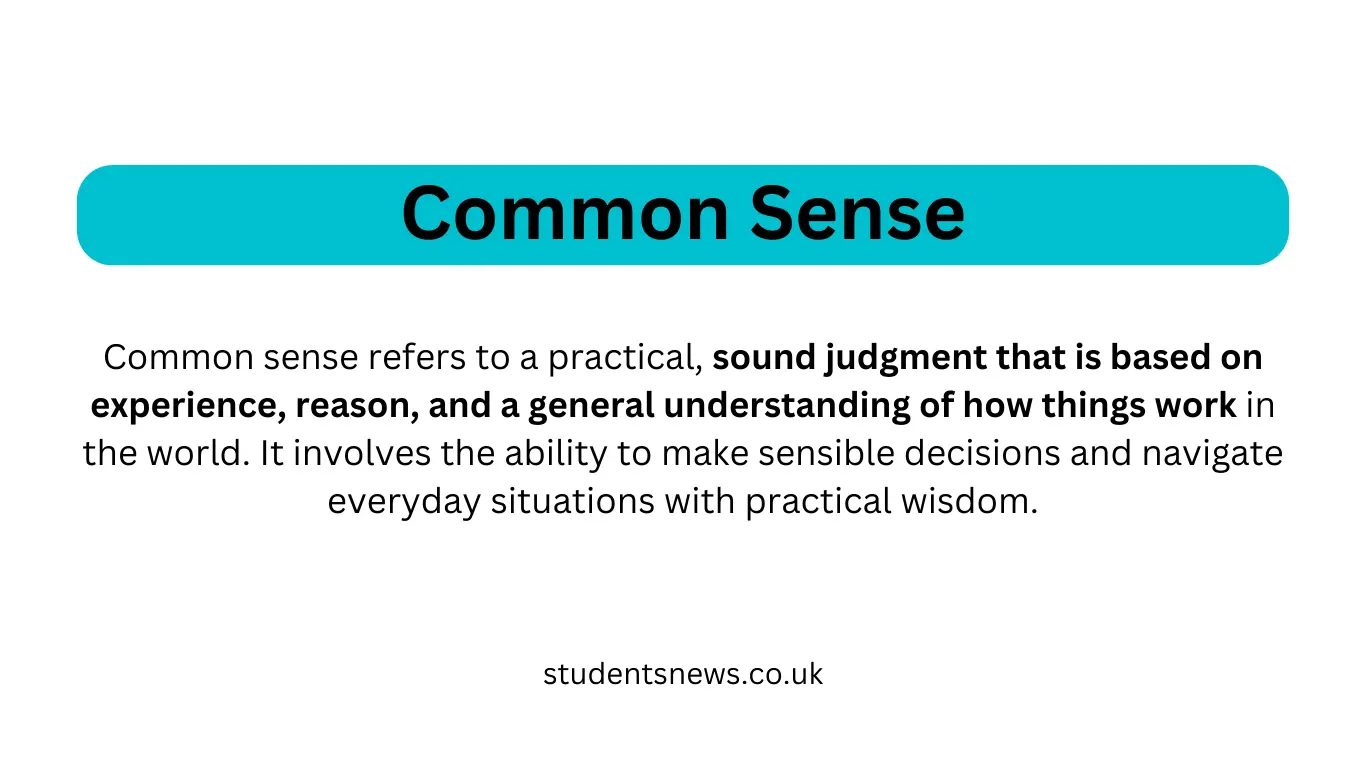In the intricate landscape of human cognition, common sense stands as a silent orchestrator, subtly influencing our perceptions and actions. Rooted in everyday experiences, common sense in psychology serves as an unseen guide, shaping decisions, judgments, and interactions. This exploration dives into the depths of common sense, dissecting its foundations and unraveling its significance in the realm of psychology.
The Foundations of Common Sense
At its essence, common sense is the shared understanding of what is reasonable and practical, sculpted by societal norms, cultural values, and individual experiences. Despite appearing innate, psychologists argue that common sense is a learned behavior emerging from cognitive processes such as perception, memory, and reasoning. It acts as a mental shortcut, aiding our navigation through life’s complexities.
Also Read: Common Sense and Sociology
Common Sense and Psychological Common Sense
| Aspect | Common Sense | Psychological Common Sense |
|---|---|---|
| Definition | Practical wisdom based on everyday experiences and intuition. | Informed by empirical research and scientific understanding of human behavior. |
| Source of Knowledge | Derived from cultural norms, personal observations, and anecdotes. | Informed by psychological theories, studies, and evidence-based practices. |
| Approach to Problem-Solving | Intuitive and practical, often relying on past experiences. | May involve systematic analysis, considering cognitive processes and decision-making factors. |
| Understanding of Emotions | Relies on intuitive knowledge of emotions and social cues. | Explores the psychological mechanisms behind emotional experiences and regulation. |
| Social Interaction | Guided by cultural norms and personal experiences. | Informed by social psychology principles, understanding social influence, perception, and communication. |
| Decision-Making | Relies on practical wisdom and common-sense reasoning. | May involve understanding cognitive biases, heuristics, and decision-making processes. |
| Personal Development Advice | Offers practical advice based on cultural expectations. | Incorporates evidence-based insights from psychology on motivation, behavior change, and personal growth. |
| Mental Health Perspective | Intuitive understanding of well-being and coping strategies. | Informed by clinical psychology, providing specialized and evidence-based perspectives on mental health. |
| Biases and Limitations | Prone to cultural biases, anecdotal errors, and individual differences. | Strives to minimize biases through scientific rigor but may still face limitations in generalization. |
How Common Sense and Psychology are Related
Understanding Human Behavior:
Both common sense and psychology aim to understand and explain human behavior. Common sense relies on practical knowledge from everyday experiences, while psychology uses scientific methods to study and analyze behavior, thoughts, and emotions.
Problem-Solving and Decision-Making:
Common sense involves using practical wisdom for problem-solving and decision-making. Psychology, particularly cognitive psychology, examines decision-making processes and information processing.
Social Interaction:
Common sense guides individuals in navigating social situations with appropriate behavior and communication. Social psychology explores how individuals perceive, influence, and relate to others.
Emotional Understanding:
Both common sense and psychology involve understanding and managing emotions. Common sense relies on intuitive knowledge, while psychology explores the mechanisms behind emotional experiences.
Personal Development:
Common sense offers practical advice on personal development, motivation, and interpersonal skills. Psychology provides evidence-based insights into human development, personality, and growth.
Mental Health:
Common sense includes intuitive ideas about mental well-being and coping strategies. Clinical psychology focuses on diagnosing and treating mental health disorders, offering specialized and evidence-based perspectives.
Common Sense and Decision-Making
In the field of psychology, common sense plays a pivotal role in decision-making. Individuals often employ heuristics, mental shortcuts grounded in common sense, to make judgments and choices. These heuristics, influenced by past experiences and societal norms, offer an efficient way to make decisions without exhaustive cognitive effort. However, the reliance on common sense is not without its pitfalls, as cognitive biases can distort perceptions and lead to flawed judgments.
Cultural Variations in Common Sense
An intriguing facet of common sense in psychology is its cultural variability. What constitutes common sense in one society may differ in another, shaped by cultural norms and values. Psychologists explore these cultural nuances to gain insights into how diverse societies navigate challenges and interpret the world. Recognizing the cultural dimensions of common sense enhances our understanding of human behavior.
The Evolution of Common Sense
As society evolves, so does common sense. Psychologists investigate its dynamic nature, exploring how it adapts to societal changes, technological advancements, and shifts in cultural paradigms. Common sense, once considered universally applicable, undergoes transformations over time. Understanding its evolution offers valuable insights into the complexities of human cognition.
Conclusion
In conclusion, common sense in psychology serves as a multifaceted and dynamic force, influencing our understanding of the world and guiding our actions. By unraveling its threads, psychologists gain profound insights into decision-making, cognitive processes, and cultural influences. As we continue to probe the intricacies of common sense, we unlock the potential to better comprehend ourselves and the intricate tapestry of human behavior.



[…] Common sense can play a role in social control by shaping societal expectations and norms. It contributes to the establishment and reinforcement of social order by guiding individuals’ behavior based on shared understandings of what is acceptable or unacceptable. You can read about common sense and psychology here. […]